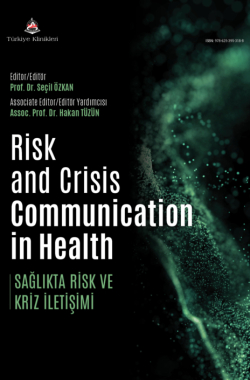Management of Health Risks and Crises in Schools
Burcu YAVUZ TABAKa
aAksaray University Faculty of Education, Department of Educational Sciences, Aksaray, Türkiye
Yavuz Tabak B. Management of health risks and crises in schools. In: Özkan S, ed. Risk and Crisis Communication in Health. 1st ed. Ankara: Türkiye Klinikleri; 2024. p.79-84.
ABSTRACT
Schools, examples of social life, have to prepare students for life while also dealing with risks and crises. The reality of crises creates the need for preparation and response readiness, that is, crisis management. The critical component of crisis management is communication. Health risks and crises affect the entire society, including schools. For this reason, schools offer a different context from other institutions. In crises, they quickly become information centers, and communication responsibilities are assigned to school administrations. Therefore, school principals need to communicate effectively with both internal and external elements. Although there are various ways to ensure effective communication, the aim is to better manage the crisis. It is important for schools and school administrations to provide this communication before, during, and after the crisis.
Keywords: School; health; risk and crisis; communication
Kaynak Göster
Referanslar
- Coombs WT. Protecting organization reputations during a crisis: The development and application of situational crisis communication theory. Corporate reputation review. 2007;10:163-76. [Crossref]
- Brock SE, Sandoval J, Lewis S. Preparing for crises in the schools: a manual for building school crisis response teams. Brandon, Vermont:Clinical Psychology. 1996.
- Karasavidou E, Alexopoulos N. School Crisis Management: Attitudes and Perceptions of Primary School Teachers. European Journal of Educational Management. 2019;2(2):73-84. [Crossref]
- Liou YH. School crisis management: A model of dynamic responsiveness to crisis life cycle. Educational Administration Quarterly. 2015;51(2):247-89. [Crossref]
- Tunç A, Atıcı FZ. Dünyada ve Türkiye'de pandemilerle mücadele: Risk ve kriz yönetimi bağlamında bir değerlendirme. Çanakkale Onsekiz Mart Üniversitesi Uluslararası Sosyal Bilimler Dergisi. 2020;5(2):329-62. [Crossref]
- Alaszewski A, Brown P. Risk, uncertainty and knowledge. Taylor & Francis; 2007 [Crossref]
- UNESCO. How Many Students Are at Risk of not Returning to School? UNESCO: Paris, France, 2020.Centrers for Disease Control and Prevention. CERC: Crisis Communication Plans 2014. Date: 03.05.2020 Available: [Link]
- Sokol RL, Heinze J, Doan J, Normand M, Grodzinski A, Pomerantz N, et al. Crisis interventions in schools: A systematic review. Journal of School Violence. 2021;20(2):241-60. [Crossref] [PubMed] [PMC]
- Centrers for Disease Control and Prevention. Crisis Emergency Risk Communication: İntroduction 2018. Date: 03.05.2020 Available: [Link]
- Reynolds B, Seeger MW. Crisis and Emergency Risk Communication as an Integrative Model. Journal of Health Communication. 2005;10:43-55. [Crossref] [PubMed]
- Heath RL. Best practices in crisis communication: Evolution of practice through research. Journal of Applied Communication Research. 2006;34(3):245-8. [Crossref]
- Centrers for Disease Control and Prevention. CERC: Crisis Communication Plans 2014. Available: [Link]
- Grasser K. Sensemaking and crisis communication: How school leaders communicate in times of crisis (Doctoral dissertation, The George Washington University). 2022.
- Coombs WT, Holladay SJ. The handbook of crisis communication. Malden, MA: Wiley-Blackwell; 2010. [Crossref]
- Grissom JA, Condon L. Leading schools and districts in times of crisis. Educational Researcher. 2021;50(5):315-24. [Crossref]
- Kowalski TJ. Evolution of the school superintendent as communicator. Communication Education. 2005;54(2):101-17. [Crossref]
- Gentilucci JL. Managing communication during a school crisis: A case study. Journal of School Public Relations. 2007;28(4):318-30. [Crossref]
- Pepper MJ, London TD, Dishman ML, Lewis JL. Leading schools during crisis: What school administrators must know. Rowman and Littlefield Education. 2010.
- Cornell DG, Sheras PL. Common errors in school crisis response: Learning from our mistakes. Psychology in the Schools. 1998;35(3):297-307. [Crossref]
- Smith L, Riley D. School leadership in times of crisis. School Leadership and Management: Formerly School Organisation. 2012;32(1):57-71. [Crossref]
- Robert B, Lajtha C. A new approach to crisis management. Journal of contingencies and crisis management. 2002;10(4):181-91. [Crossref]

